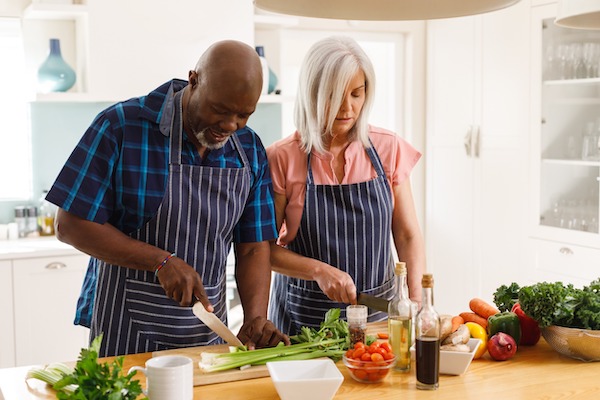Essential Nutrition Strategies for People with Cancer
by Angela Matthewson, MPH, RDN, CSO, and Rhone Levin, MEd, RDN, CSO, LDN
Eating a balanced, plant-based diet is important throughout our lives. Not only does good nutrition help support your overall health, but it also reduces your risk for chronic diseases, including many cancers.
During cancer treatment, nutrition is essential. Eating healthful foods can help you better tolerate treatment and may even improve treatment response. However, eating well during cancer treatment isn’t always so simple.
Grazing can help you increase your nutritional intake by removing the pressure to finish full portions during mealtimes and allowing for frequent snacking instead.
Strategies for Healthy Eating
When it comes to nutrition, cancer presents survivors with a cruel paradox. Undergoing cancer treatment increases your body’s demand for energy, protein, and certain nutrients, all while diminishing your interest in food. However, it is
possible to get the nutrients you need even when your appetite isn’t fully on board. Here are some strategies to help you eat well during cancer treatment.
- When you feel well, eat a balanced diet. Plan to eat at least three meals a day, with an emphasis on consuming protein at mealtimes. Each meal should also include a whole grain carbohydrate, and you should eat fruits and vegetables at mealtimes and snack times.
- When side effects make eating difficult, eat what you can tolerate. But above all, just eat something!
- Be flexible with your usual routines.
- Keep track of your symptoms and note side effects across the treatment cycle. Write down what foods and beverages are most appealing each day, and use this information to tailor your meals and snacks during the next treatment cycle.
- Eat more frequently. Grazing can help you increase your nutritional intake by removing the pressure to finish full portions during mealtimes and allowing for frequent snacking instead.
- Schedule meals and snacks “by the clock.” Don’t wait until you feel hungry to eat. Instead, eat at regular intervals to supply nourishment to your body. When your scheduled meal or snack time rolls around, ask yourself “What can I tolerate eating right now?” instead of “Am I hungry?”
- Make every bite count. Opt for nutrient-dense foods whenever you can, and stick with full-calorie foods during treatment and recovery, as they offer more nourishment.
- Make every sip count. Drinking water is important; however, during cancer treatment, you want to try drinking beverages with nutritional value. For example, a small glass of juice offers energy, electrolytes, and hydrating fluids. A glass of milk offers energy, protein, and minerals. Some people undergoing cancer treatment find drinking easier than eating. If eating a full meal seems overwhelming, you can try drinking protein shakes or smoothies as a meal replacement.
- Turn a snack into a mini meal by pairing two food groups together. For example, grapes and cheese cubes, peanut butter on crackers, or yogurt topped with berries.
Frequently Asked Questions About Diet & Nutrition
A cancer diagnosis can bring up a lot of questions about diet and nutrition. Unfortunately, there is also a lot of misinformation out there. How do you know what is fact and what is fiction? If you are searching online, only visit reputable websites you can trust. Reliable sources include websites supported by hospitals, universities, government agencies, and public health organizations. Websites that are selling products may offer biased information. If you are unsure about any nutritional advice, check with your medical team.
Here are some of the most frequently asked questions we receive as oncology dietitians.
Are nutritional supplements safe to take?
Vitamin, mineral, and herbal supplements are not subject to regulation by the U.S. Food & Drug Administration, and they are not mandated to undergo randomized clinical trials. Many supplements have known interactions with common medications. Moreover, there is no compelling evidence that shows these types of alternative therapies are effective in oncology treatment, and they often carry considerable risks when used concurrently with chemotherapy or immunotherapy. Always report any supplement use to your medical team, and talk with your doctor before starting a new vitamin or supplement.
Should I only eat organic and non-GMO foods?
You may have heard organic produce is best, or that GMOs (genetically modified organisms) are bad. However, there is no research proving this. In fact, all the evidence showing health benefits of fruits and vegetables includes conventional produce you can buy at the grocery store. You do not have to eat organic produce to receive health benefits.
What about sugar and cancer? Doesn’t sugar “feed” cancer cells?
There is a lot of misinformation about this topic, yet the factual evidence does not support a no-sugar diet. In fact, there is currently no evidence showing that dietary sugar directly fuels cancer growth, or that eliminating sugar can slow cancer growth. While researchers continue to investigate the connections between diet and cancer, it remains a source of anxiety-inducing misinformation in the media and on the internet. The truth is, the food you eat can provide essential support during cancer treatment, but it cannot directly target cancer cells. As is often the case, the key to sugar intake is moderation and balance.
Is soy a safe food for cancer survivors?
Soybeans are an excellent protein source. Questions have arisen in the past about whether soy’s bioactive compounds, including those called isoflavones, mimic estrogen enough that they may be contraindicated for certain cancer diagnoses. Research has shown that whole soy foods (soybeans, soy milk, soy flours, edamame, tofu, miso, and soybean paste) are part of a healthy diet and can be consumed safely by people with cancer. However, those foods made from soy protein concentrate powders, or supplements made from soy-isolated proteins, should be used infrequently or consumed with caution.
Nutritional Side Effects of Cancer Treatment
Cancer treatment, as well as the cancer itself, can cause side effects that interfere with your natural appetite and prevent you from enjoying your usual meals. This can set off a cascade effect, wherein reduced calorie intake may lead to unintended weight loss, which may lead to muscle loss. This unintentional weight loss and decreased muscle mass may then worsen fatigue and may ultimately reduce treatment tolerance. However, there are things you can do to combat the nutritional side effects of cancer treatment
- If you have a decreased appetite, try to eat smaller meals more often, pack additional calories into every bite or sip, and create cues to remind yourself to eat.
- For nausea (with or without vomiting), eat small, frequent meals. Opt for bland, starchy foods and clear liquids (such as broth soups, juice, and soda). Try to include sour or tart flavors (for example, add lemon to your water or sip on cranberry juice at meals). Eat foods that are cool or room temperature, and stay away from food preparation spaces to avoid strong aromas. Take nausea medication as prescribed. You may also find that ginger helps with nausea. You can try it in foods, teas, or lozenges.
- If you’re experiencing an altered sense of taste, choose foods with strong flavor profiles, like citrus, vinegars, and sweet or sour sauces. Avoid using metal utensils, and opt for plastic instead.
- To help with changes in bowel habits, add soluble fiber, such as bananas, oatmeal, and applesauce, to your diet. This can help with both diarrhea and constipation. You should also be sure you are drinking enough fluids. Sixty-four ounces is a good goal for most people. Remember, all fluid counts toward hydration.
- If you have a sore mouth or throat, stick with foods that are soft and easy to chew and swallow. Opt for non-acidic fruits, juices, and sauces. Additionally, you should maintain good oral care, rinse with a soothing oral rinse several times a day, and avoid alcohol, including in mouthwash.
- To combat fatigue, keep ready-to-eat, frozen, or easy-to-prepare meals available. You can also freeze individual servings of larger meals. Try to include protein with each meal to increase your energy, and be sure to stay well hydrated. To help conserve your energy, let family and friends make meals for you.
A Final Word on Cancer & Nutrition
Managing nutrition-related side effects can help you avoid treatment delays, improve your quality of life, and support your immune system. If that means eating foods you would usually avoid, that’s OK. Short-term changes to your diet will not undo the benefits of long-term healthy habits. If you are also managing other chronic health issues, such as high blood pressure or diabetes, talk to your doctor about whether you can relax these diet restrictions.
If you are having trouble getting adequate nutrition, ask your doctor for a referral to a registered dietitian or nutritionist who is board-certified in oncology nutrition. These professionals are uniquely qualified to help you separate fact from fiction when it comes to nutrition information. They can also help you translate this information into a personalized nutrition action plan.
Think of nutrition as the support you can give your body to undergo the treatment it needs to get well. So much is out of your control during cancer treatment, but your diet is something you can take charge of. Eating a healthy, balanced diet can make a significant difference in your cancer treatment and recovery.

Angela Matthewson (left) is a clinical oncology dietitian with Florida Cancer Specialists & Research Institute in Fort Myers, FL. She has been a board-certified specialist in oncology nutrition since 2015. Previously, Angela worked as a certified nutrition support dietitian for nine years at Mayo Clinic in Jacksonville, FL.

Rhone Levin (right) is a clinical oncology dietitian, also with Florida Cancer Specialists & Research Institute. She is a fellow in the Academy of Nutrition and Dietetics and a board-certified specialist in oncology nutrition. Rhone has specialized in oncology nutrition for over 25 years.
If you don’t have access to a registered dietitian at your cancer center, you can find one through the Academy of Nutrition and Dietetics “Find a Nutrition Expert” tool at eatright.org/find-a-nutrition-expert.
This article was published in Coping® with Cancer magazine, Spring/Summer 2023.


